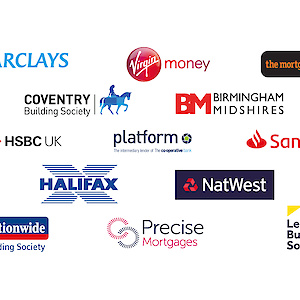


Head of Content

Mortgage Advisor & Director

Having a county court judgment (CCJ) on your credit record can make it more difficult to secure finance, such as a mortgage; but is it achievable for you? Read through our comprehensive guide to find out what your options could be, how to boost your chances of mortgage approval and much more.
How does having a CCJ affect a mortgage application?
With a CCJ on your credit files, it can be more difficult to secure finance, such as a mortgage. The majority of lenders will prefer the judgment to have been fully discharged before they are willing to consider you for any kind of loan, particularly a mortgage.
Even after discharge, mortgage providers might view your application with caution until the CCJ has disappeared from your records, which takes six years. Applying with a CCJ still on your credit records means you could end up having to pay higher interest rates or put down a larger amount of deposit to reduce the level of risk the mortgage provider is taking on.
If you have an existing mortgage, entering a CCJ won’t have an immediate impact on it, but when the time comes to remortgage, your options are likely to be more restricted.
Can you get a mortgage with a CCJ?
Yes but some lenders will want the CCJ to be satisfied before they will even consider you for a mortgage. Even a satisfied CCJ can impact your application, though, and make it harder to get approved, but the good news is that your chances of success will increase over time.
While it’s possible to get approved for a mortgage with an unsatisfied CCJ, the number of lenders and deals available will rise when it has been paid off, and as time passes, steadily improving right up to that six-year mark when the issue disappears from your credit reports.
The mortgage lender will assess your CCJ by reviewing the following factors:
-
When it was registered: Judgments registered in the last 12 months can have a far greater impact than ones that were registered at least three years ago. Having a CCJ against you in the last year is more likely to mean having to pay a higher deposit.
-
How many CCJs you have: Having more than one judgment is more likely to mean restrictions from the lender, such as a cap on the loan-to-value (LTV) ratio.
-
How much they are for: Higher value CCJs can affect the LTV ratio mortgage lenders are willing to offer and could drive it down to within the 65% to 75% region.
Depending on how much of a risk they think your bad credit poses, your lender might ask you to put down additional deposit or only approve you at a higher interest rate.
Can you get a joint mortgage with a CCJ?
Yes. If you are applying for a joint mortgage and one applicant has a county court judgment, this will be taken on board but some lenders will look at the overall strength of the application and may view it more favourably if the other applicant has clean credit.
However, it is worth reiterating that applying with somebody who has clean credit doesn’t mean your CCJ will be overlooked entirely. The mortgage provider will still review the age, amount of CCJ and how much they are for, and factor this into their lending decision.
If both applicants have CCJs, this will likely prove more problematic, but there are specialist lenders who might be willing to look at all of the variables and offer you a deal.
Remortgaging with a CCJ
Having a CCJ can make it more difficult to remortgage, especially if the judgment was made against you after you took out your original mortgage. In this scenario, there’s a chance you will end up on a higher rate than what you currently have, though this is not a certainly.
When making your mortgage repayments, you will have built up equity in your property, and the more you have, the better your chances of getting a remortgage with a CCJ.
The biggest risk you face if you have an unsatisfied CCJ is being unable to fix your mortgage back in when its initial rates period expires. The judgment could prevent you from qualifying for a new deal, which might mean ending up on a costly standard variable rate (SVR).
Speak to a mortgage broker as soon as possible if you find yourself in this situation as the right adviser could help you explore options with specialist lenders.
Lending criteria
In addition to reviewing your CCJ, mortgage lenders will also base eligibility on these factors:
-
How much deposit you have: With a CCJ, you may need to put down more deposit. The exact amount will vary depending on the age, amount, number of CCJs you have and whether they have been satisfied, but it can range from 15-35%.
-
Age: Specialist advice might be needed if you will be aged between 75 and 85 years old, either during or at the beginning of the mortgage term, as some lenders will likely be concerned about your ability to make your repayments after retirement.
-
Property type: If the home you are buying has any instances of non-standard construction - such as a thatched roof or steel frame - this can add to the overall risk the lender is taking on, but there are specialist mortgage providers for this scenario.
The criteria above was sourced from Criteria Brain and Knowledge Bank.
How to get a mortgage with a CCJ

Follow these quick and easy steps to start your mortgage application the right way.
-
Download your credit reports: You should review what information the credit reference agencies are displaying about your CCJ and wider credit situation. Make sure it’s fully accurate and up to date, and be sure to challenge the agencies if it isn’t. Head to Checkmyfile to access a trial and download your reports for free.
-
Get your paperwork ready: Having the right documents in order can save time when it comes to full application. You’ll need proof of address, ID and three months’ bank statements. If your CCJ has been satisfied, you will have received a letter to confirm this, and your mortgage lender may request to see it during their checks.
-
Speak to a mortgage broker: A whole-of-market mortgage broker can tip the odds in your favour and offset the risk posed by a CCJ. There are brokers at Teito who specialise in bad credit, and their expertise and lender contacts can boost your chances of securing the mortgage you need - get started with an adviser below:

Connect with a bad credit mortgage specialist
How long should you wait to apply?
There’s no reason you shouldn’t speak to a mortgage broker to find out what your options are even when your CCJ remains unsatisfied. There could be lenders available; but the best deals should gradually become accessible 1-3 years after the issue has been satisfied.
List of mortgage lenders for borrowers with CCJs
Below you will find examples of mortgage lenders who consider applications from borrowers with CCJs, along with some of the specific criteria you may encounter:
-
Halifax: Will consider applicants with CCJs but will use credit scoring when making their final lending decision and may request additional background details.
-
Pepper Money: Will consider your application and has no upper limit on the number of CCJs you can have or their value, as long as the judgments were over three years ago.
-
Natwest: Can potentially ignore any CCJs that were registered 36 months ago, but their final lending decision will be subject to credit scoring.
-
Bluestone: Will lend to borrowers with multiple CCJs, as long as no more than three were registered in the last three years and none were in the last six months. Any CCJs under the value of £300 or related to a mobile phone contract will be disregarded.
-
Santander: Consider applicants with recent CCJs but may decline to offer a mortgage depending on the amount and recency of the CCJ, as well as the LTV ratio.
-
Skipton Building Society: Will consider applicants with no more than one CCJ for £500 or less within the last three years that was satisfied at least a year ago.
You can read more about the available providers in our bad credit mortgage lenders guide.
How much can you borrow
A satisfied CCJ won’t have a direct impact on your affordability. Your maximum borrowing will still be capped at 4.5 times your annual salary at most mortgage lenders, while a smaller number might use a higher income multiple than this, up to six times income in rare cases.
You may find it more difficult to access these higher income multiples as your bad credit could mean access to fewer lenders and mortgage deals.
Use our calculator below to get a rough idea of your affordability:
Tips to help you get approved for a mortgage with a CCJ
The tips below can help boost your chances of mortgage approval with a county court judgment against your name:
-
Try to pay the creditor within a month: If it’s a newly issued CCJ and you are able to pay the creditor within a month, you can apply to the court to have the judgment removed from the register, as long as you present proof of it being paid.
-
Apply for a certificate of satisfaction: If you settle the CCJ after the first month, you should still apply to the court for a certificate of satisfaction as there are likely to be more mortgage options available with proof your CCJ is satisfied.
-
Save extra deposit if possible: If you are in a position to delay your plans to save additional deposit, this can go a long way towards boosting your mortgage eligibility.
-
Build credit where possible: There are quick and easy ways to optimise your credit files, including joining the electoral register, responsible use of credit builder cards and paying all bills on time and in full during the run-up to your application.
Lee Trett, Teito founder and mortgage adviser, is quick to emphasise that you don’t need to postpone your mortgage plans due to a CJ, though there can be advantages to doing so.
“It’s important to remember that there are specialist mortgage lenders available for borrowers with all kinds of adverse credit, so those who are keen to buy a property right away could well have options, despite having a CCJ against their name.
“However, delaying things could mean your credit situation improves over time and you have the chance to save extra deposit, opening you up to better deals. It’s a good idea to sit down with a mortgage broker and discuss when would be the best time to apply for finance.”

Lee Trett - Mortgage Advisor & Director
Why choose Teito for your mortgage needs?
If you have a county court judgment against your name, one of Teito’s bad credit mortgage brokers can boost your chances of securing the mortgage you need.
With whole-of-market knowledge and working relationships with specialist lenders, our five-star-rated advisors can help you access a wider range of deals, including exclusive, broker-only offers that aren’t available directly from mortgage lenders.
Here are some of the other benefits of choosing Teito:
- Our advisors are experts in bad credit, including CCJs
- You can get a free rates comparison
- Our mortgage brokers are five-star rated
- We can help you secure an agreement in principle in minutes
Ready to get started with a bad credit mortgage specialist? Make an enquiry online to set up a free, no-obligation chat with an expert broker today
FAQs
A county court judgment, or CCJ, is a type of court ruling you might have on your credit files if someone takes legal action against you, claiming you owe them money and haven’t responded to requests for it. A judgment will arrive by post if the court agrees the debt is legitimate and needs to be paid.
The judgment will outline how much you owe, who it is payable to and how to pay, along with a deadline for when the debt needs to be settled by. A county court judgment will remain on your credit reports for six years, unless you clear the debt within a month.
You can check whether you have one or the status of one you are aware of by accessing a free, cancel-anytime trial with Checkmyfile.
Choosing an Adviser
Selecting a qualified and experienced mortgage adviser is of great importance. To choose a suitable adviser, evaluate their qualifications, experience, and reputation, and ensure they are regulated by the Financial Conduct Authority (FCA).
Read reviews from previous clients and make sure they provide a clear explanation of the products and services they offer, as well as the fees and charges associated with them.

























































































































































